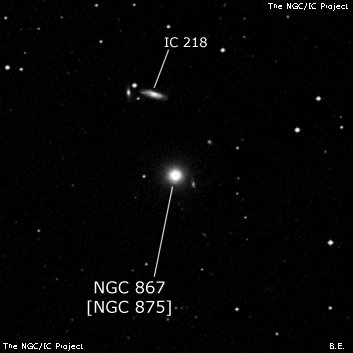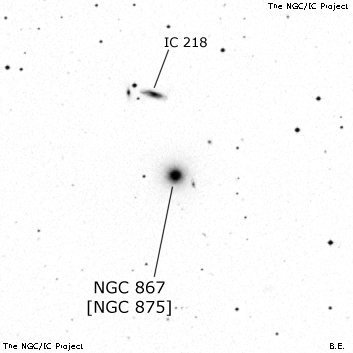NGC/IC Project Restoration Effort
(This is a very very beta version)
NGC867


Basic Information
Location and Magnitude
Right Ascension: 2:17:4.8
Declination: +1:14:41
Constellation: CET
Visual Magnitude: 12.9
Historic Information
Discoverer: Herschel W.
Year of discovery: 1783
Discovery aperture: 18.7
Observational
Summary description: eF, vS, R, bM
Sub-type: S0-a
Corwin's Notes
=====
NGC 867 may be the same galaxy as NGC 875. Or it may be the same as IC 225.
Or it may be neither, or another galaxy altogether. I don't have enough
information to tell. Here is the story.
This is the second of WH's third class (very faint) of nebulae, found during
his first season of sweeping the sky. He placed it "13 minutes :: following,
-- north" of 60 Ceti. Dreyer has a note in the Scientific Papers that reads
(in full):
Sweep 61, Dec 21, 1783. "An almost invisible F. neb., it is R. and about 8
or 10 arcsec diameter, being brighter in the center than outwards. It can
only be seen when the glass is perfectly clean and the attention confined to
the object." By two diagrams, it is about 1 1/2 deg nf a star which was
taken to be 69 Ceti, but obs. was interrupted by clouds. Not found by
Bigourdan twice.
In his 1912 MN list of corrections to WH's NGC nebulae, Dreyer shortens this
to read merely, "The place of III.2 is extremely uncertain."
The suggestion that it might be NGC 875 comes from d'A who found N875 and
measured a pretty accurate position for it. Dreyer copied this suggestion
into the NGC description for N875. Auwers, in his reduction of WH's nebulae
places N867 at "02 07 29, -1::" for 1830 which places it at 02 13 37, -0.5 for
1950. This is more than a degree south of the GC (and NGC) position, and I
wonder if Auwers has his declination sign wrong. He has no note for the
object, nor does JH in GC.
And that is pretty much it as far as the observations go. The crude offset
from 60 Ceti suggests that N875 is the galaxy WH saw, while the 69 Ceti note
suggests that IC 225 might be his object. NGC 875 is brighter by half a
magnitude and is therefore the more obvious choice, but the agreement of the
diagrams -- assuming the identification of the star as 69 Ceti is correct --
is also compelling.
We will have to go back to WH's observing records for the sweep to look for
other clues. For example, I suspect that Dreyer has replaced the original
offset published in PT, but that is only a suspicion, based on JH's adoption
of a fully-reduced position in GC, and on Auwers's partially-reduced position.
So, at the moment, all I can say is "NGC 867 may be the same galaxy as NGC
875. Or it may be the same as IC 225. Or ..."
-----
I find Dreyer's note in the Scientific Papers a bit curious. CH's fair copy
of the Sweep says only "A nebula eF, R, 8 or 10[arcsec] d, bM. 60 Ceti f
13[min] PD about 89[deg] 53[arcmin]. For description see F[ixt] St[ars],
Vol. 5, page 476". Dreyer apparently copied that description into his note.
The curiosity comes because CH has clearly written "60 [sixty] Ceti", not
69 [sixty nine] Ceti". Though that star, whichever one it is, is the only
star in the sweep, it's clock correction agrees reasonably well with the only
other star with a similar correction from the same night, 55 Piscium in the
previous sweep: -5h 37m 02.9s for 60 Ceti, and -5h 29m 39.8s for 55 Piscium.
Had the star been 69 Ceti, the correction would have been -5h 18m 17.7s. The
difference of nearly 20 minutes with 55 Psc compared with just 7.4 minutes
makes the identity of 60 Ceti more likely in my mind, though the other is
certainly possible.
So, I come back again to NGC 875. That fits WH's description, and while I am
not going to change the question mark on the identification, I think the
meager evidence leads us to this galaxy as WH's object from his early sweep.
The position I give in the table, by the way, is CH's 1800 position (02 05 37,
89 58 [NPD]) precessed to J2000. It is clearly very uncertain with the RA
given to a full minute of time, and the NPD merely estimated.
Steve's Notes
=====
NGC 867
See observing notes for NGC 875. Possibly equal to IC 225.



